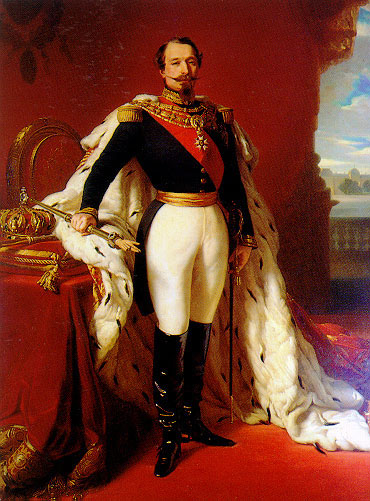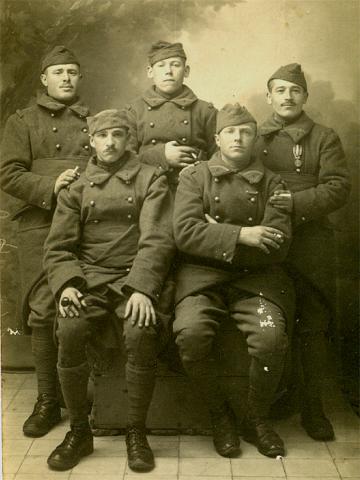Etienne Rameau
Etienne was born in the town of Perpignan in the Pyrenees Orientales departement in the Southern region of our beloved mother. Meaning, our country. Perhaps for the more despicably lascivious proponents of our cause there had been mistaken consideration of my phrasings.

His father, Beaumont Arago, was a farmer of Cork Oaks, Quercus Suber. His particular brand of corks were renowned throughout all of France as the most refined and expertly crafted of all wine stoppers, at least by he and his family. It is rumoured that Napoleon III once commented "J'aime ces plus que ma propre vie" referring to the delicate work of Monsieur Arago's corks. Admittedly the Emperor was exceptionally inebriated by the spindly influence of the fermented grape, and could have indeed been referring to the ample bosom of the lady who's lap he was laying upon at the time, but a bottle of 1842 Chardonnay was close at hand and an Arago cork was in clear eyesight, even if perhaps potentially peripherally. Nevertheless quite a claim to fame I'm sure you'll all agree.
Beaumont Arago was the bastard child of Francois Arago, the servant of the stars and the liberal mind behind much of our particular variety of mischief. As you probably recall it was Arago the elder's influence that abolished slavery in the colonies in 1853. As a resident of Perpignan for many years, a statue honoring his efforts stands in the center of town. Beaumont never met Francois, as in a weak moment the prior Arago had spent his evening curled in the arms of a lady of easy virtue, who's child (Beaumont) was a source of immense humiliation and shame for the astronomer politician.
Beaumont exacted his revenge by focusing all his efforts on the industry he was sure would bring his unsurpassable fame and glory: Cork Oak farming.
Beaumont met Etienne's mother Elodie Rameau in Paris. Beaumont had travelled to the capital to sell his wares to the exclusive, expensive, and illustrious restaurants frequented by the Parisian elite. In one particular restaurant known as Les Poissons Malades, Beaumont found Elodie. She sang opera tunes outside the restaurant in hope that one of the various famed musicians, singers, and theatrical folk might hire her for work upon the stage she longed to tread. Alas, both Beaumont and Elodie's efforts were in vain.
In one particular restaurant known as Les Poissons Malades, Beaumont found Elodie. She sang opera tunes outside the restaurant in hope that one of the various famed musicians, singers, and theatrical folk might hire her for work upon the stage she longed to tread. Alas, both Beaumont and Elodie's efforts were in vain.
Beaumont and Elodie were married almost immediately, possibly as a subsequent buffer to the unfortunate embarassment and pain caused by the rejection from Les Poissons Malades. Within a few short years they had had Etienne, who grew to be strong, resolute of mind, and enviably handsome.
Etienne was born in Perpignan, as Beaumont had stolen Elodie back to his home town in efforts to salvage his last hopes of fame by creating novelty corks. Corks of all shapes and sizes carved into innumerable varieties of naughty sculptures representing the more questionable aspects of the male and female anatomy.
Etienne himself took very fondly to carving images from Greek Mythology. His pegasus cork still sits in the Louvre today. Admittedly not as part of an exhibition, but due to our leaving the bottle of wine corked with his masterpiece in the Louvre on our ill-fated mission to steal Joseph- Marie Vien's 'Cupid Seller'. Upon my return to retrieve the bottle and the cork manifestation of Perseus' famed winged horse, I was quite simply merde hors de la chance. One must assume however that the maintainers of the museum, bearing such an appreciation for fine art would never disregard the craftsmanship of our own Etienne.
assume however that the maintainers of the museum, bearing such an appreciation for fine art would never disregard the craftsmanship of our own Etienne.
Etienne's ability as a sculptor obviously came into clear conflict with his father's efforts, leading to such strife and misery, that Etienne left home in 1902 and joined the French Legion where he met us, The Infantry.
Etienne deciding to completely remove himself from the misery of association with his father opted to adopt his mother's maiden name as his own and became Etienne Rameau desiring no remnant of ties to the Arago family.
For now this is all I can tell you of Etienne, I fear I have risked too much in being so enthusiastic and detailed in my description of his life. In due time the conflict with his father will be given it's due weight in retelling, but for now we must disappear again.
. . . Etienne is an expert cook.

His father, Beaumont Arago, was a farmer of Cork Oaks, Quercus Suber. His particular brand of corks were renowned throughout all of France as the most refined and expertly crafted of all wine stoppers, at least by he and his family. It is rumoured that Napoleon III once commented "J'aime ces plus que ma propre vie" referring to the delicate work of Monsieur Arago's corks. Admittedly the Emperor was exceptionally inebriated by the spindly influence of the fermented grape, and could have indeed been referring to the ample bosom of the lady who's lap he was laying upon at the time, but a bottle of 1842 Chardonnay was close at hand and an Arago cork was in clear eyesight, even if perhaps potentially peripherally. Nevertheless quite a claim to fame I'm sure you'll all agree.
Beaumont Arago was the bastard child of Francois Arago, the servant of the stars and the liberal mind behind much of our particular variety of mischief. As you probably recall it was Arago the elder's influence that abolished slavery in the colonies in 1853. As a resident of Perpignan for many years, a statue honoring his efforts stands in the center of town. Beaumont never met Francois, as in a weak moment the prior Arago had spent his evening curled in the arms of a lady of easy virtue, who's child (Beaumont) was a source of immense humiliation and shame for the astronomer politician.
Beaumont exacted his revenge by focusing all his efforts on the industry he was sure would bring his unsurpassable fame and glory: Cork Oak farming.
Beaumont met Etienne's mother Elodie Rameau in Paris. Beaumont had travelled to the capital to sell his wares to the exclusive, expensive, and illustrious restaurants frequented by the Parisian elite.
 In one particular restaurant known as Les Poissons Malades, Beaumont found Elodie. She sang opera tunes outside the restaurant in hope that one of the various famed musicians, singers, and theatrical folk might hire her for work upon the stage she longed to tread. Alas, both Beaumont and Elodie's efforts were in vain.
In one particular restaurant known as Les Poissons Malades, Beaumont found Elodie. She sang opera tunes outside the restaurant in hope that one of the various famed musicians, singers, and theatrical folk might hire her for work upon the stage she longed to tread. Alas, both Beaumont and Elodie's efforts were in vain.Beaumont and Elodie were married almost immediately, possibly as a subsequent buffer to the unfortunate embarassment and pain caused by the rejection from Les Poissons Malades. Within a few short years they had had Etienne, who grew to be strong, resolute of mind, and enviably handsome.
Etienne was born in Perpignan, as Beaumont had stolen Elodie back to his home town in efforts to salvage his last hopes of fame by creating novelty corks. Corks of all shapes and sizes carved into innumerable varieties of naughty sculptures representing the more questionable aspects of the male and female anatomy.
Etienne himself took very fondly to carving images from Greek Mythology. His pegasus cork still sits in the Louvre today. Admittedly not as part of an exhibition, but due to our leaving the bottle of wine corked with his masterpiece in the Louvre on our ill-fated mission to steal Joseph- Marie Vien's 'Cupid Seller'. Upon my return to retrieve the bottle and the cork manifestation of Perseus' famed winged horse, I was quite simply merde hors de la chance. One must
 assume however that the maintainers of the museum, bearing such an appreciation for fine art would never disregard the craftsmanship of our own Etienne.
assume however that the maintainers of the museum, bearing such an appreciation for fine art would never disregard the craftsmanship of our own Etienne.Etienne's ability as a sculptor obviously came into clear conflict with his father's efforts, leading to such strife and misery, that Etienne left home in 1902 and joined the French Legion where he met us, The Infantry.
Etienne deciding to completely remove himself from the misery of association with his father opted to adopt his mother's maiden name as his own and became Etienne Rameau desiring no remnant of ties to the Arago family.
For now this is all I can tell you of Etienne, I fear I have risked too much in being so enthusiastic and detailed in my description of his life. In due time the conflict with his father will be given it's due weight in retelling, but for now we must disappear again.
. . . Etienne is an expert cook.

<< Home